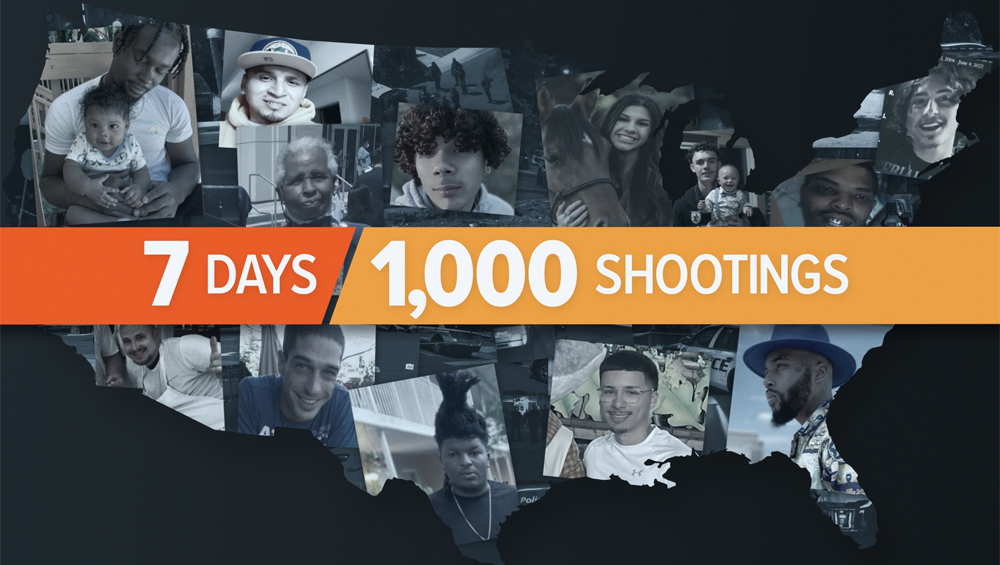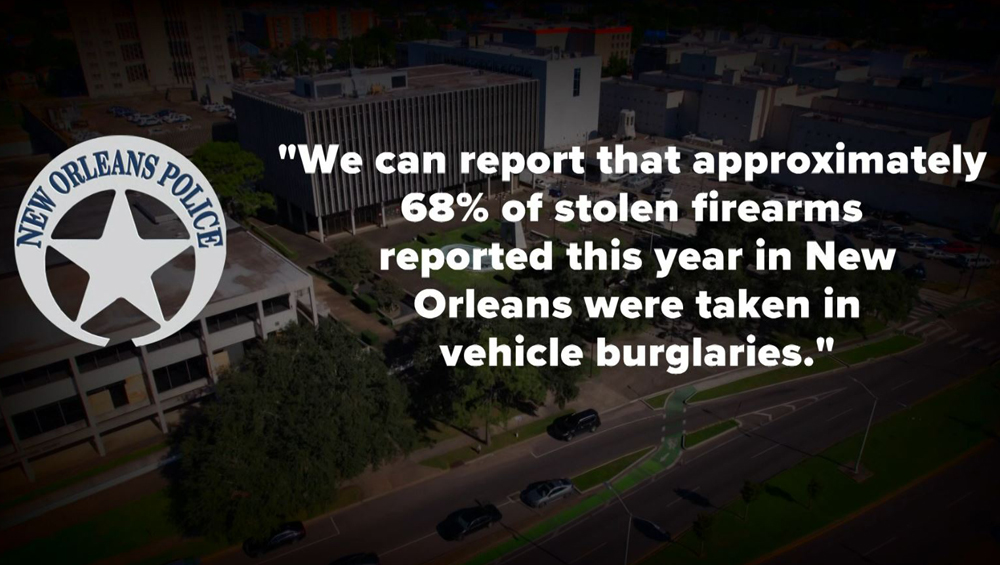
Tegna Snaps Gun Violence Reporting Out Of Its Fog

You don’t have to be in the TV news industry to have memorized the playbook for local station coverage of a shooting. Most consumers can predict the generic, 100-second packages littering A-blocks across the country, with their images of flashing lights, bullet casings and mourning families. Maybe there’s a picture of a possible suspect pulled from grainy street camera footage or Facebook every once in a while.

Katie Wilcox
Katie Wilcox, executive producer of investigations for the Tegna-owned NBC affiliate KPNX Phoenix, says those stories are among the ones newsgroups today “get a bad rep for.” But while attending the annual conference organized by the nonprofit group Investigative Reporters & Editors (IRE) in 2022, gun violence emerged as the single most important topic reporters need to cover in conversations between Wilcox and her Tegna colleagues.
“It is so consuming of our local news,” Wilcox says. “There are too many shootings, too many families that are coming to the news, too many people that are suffering.”
However, the question of how to cover gun violence in a fresh, compelling way remained.
Choosing A Timeframe
After some deliberation, Wilcox says she and her fellow reporters set out to “give a voice to people who often feel forgotten” once the next area shooting occurs. Their significant programming initiative about the topic would focus on a single week that would be relevant to viewers.
They chose the unofficial first week of summer, beginning with Memorial Day Weekend, for their focus because, according to data published by the Gun Violence Archive, it was the first seven-day period of 2022 in which 1,000 shootings were reported in the U.S.
“It’s kind of cyclical,” Wilcox says. “Shootings tend to increase over the summer, but definitely we’ve been seeing an unsettling trend of increasing gun violence since the pandemic.”
The 7 Days, 1,000 Shootings initiative, encouraging local Tegna markets to revisit stories of shootings from the week around Memorial Day of 2022, was launched. Ultimately, reporters in eight markets — KPNX Phoenix, KUSA-KTVD Denver, WTHR Indianapolis, WCNC Charlotte, KHOU Houston, WWL New Orleans, WTSP Tampa and WBNS Columbus — chronicled how shooting victims, their loved ones and communities have fared in the year since their respective violent events occurred, among other related issues.
The new segments aired between May 29 and June 4 of this year. Some markets produced multiple stories, and they looked at reasons why many shootings go unsolved (in places like Tampa), the fact that people of color represent the majority of shooting suspects and victims (as is the case in Charlotte) and whether gun violence could be treated as a country-wide public health crisis.
Diving Deeper

Cierra Putman

Susan Batt
Cierra Putman, investigative reporter for WTHR Indianapolis, worked on three pieces alongside special projects producer Susan Batt, primarily focused on the plight of survivors.
“The majority of people who are shooting victims, they survive,” Putman points out. “I wanted to show people how [shootings are] impacting individual families, individual communities, because I wanted people to start thinking about it that way as opposed to, ‘Oh well, that’s one person who’s no longer with us.’ No, these shootings have long-term effects on people and sometimes we don’t talk about that.”
“It is imperative for our community, when we’re talking about this particular topic, to go beyond the who, what, where, when, why,” says Katie Moore, an investigative reporter and anchor at WWL New Orleans. “The how has to be part of that conversation and I think that the why needs to be explored more than just: ‘Police have identified x, y and z as a motive.’”
Moore’s contribution to the 7 Days, 1,000 Shootings project disclosed disheartening statistics about the high rate of gun violence in New Orleans, as well as Louisiana writ large, which significantly outpaces states like Texas (by fourfold) and California (eightfold). She also covered the concern over increasing gun thefts across the U.S. Predictably, many of those guns end up playing a role in violent acts.

Katie Moore
But Moore’s piece started with a particularly sad story about an 80-year-old woman who was shot and killed while attending her grandson’s high school graduation ceremony. The octogenarian was struck down by a stray bullet that was fired after members of two families, including a 15-year-old, turned to firearms to end a verbal argument. Instead, they took the life of Augustine Greenwood and devastated her surviving relatives.
“If people can’t hear the stories of the people who were affected by [gun violence], what is ever going to stop it?” Moore says. “We’ve had policing experts over and over say, ‘You can’t arrest your way out of this problem.’ So, the solution has to lie somewhere else, and by telling these stories in our communities, that’s one of the ways where we can make a big difference.”
Some of the Tegna packages shed light on possible solutions to the gun violence problem — the type of coverage consumers positively respond to. For example, Nate Morabito, investigative reporter at WCNC Charlotte, reported about one local hospital that already has a program that treats gun violence as a public health issue. There, doctors connect patients to services for secure housing and other benefits. It’s a model already happening in Morabito’s community and could be scalable elsewhere.
Back in Phoenix, at KPNX, one of Wilcox’s 7 Days, 1,000 Shootings pieces analyzed cases with teen victims. The mother of a friend to one of the teens killed in the Phoenix area last year was the source of one proposed solution. “I want to see stricter laws regarding the parents,” she told Wilcox. “When a child has a gun, either on social media, or walking the street or being caught in a car, the parents need to be held accountable for their children. I want to see — in high schools, in junior high and elementary schools — a hotline where you can call about a child who has access to a gun or who is talking about firearms.”
Wilcox says the audience response to KPNX’s 7 Days, 1,000 Shootings was “overwhelming.” The station fielded many messages from local teens telling stories of other friends of theirs who were shot, she says. The teens also revealed that they are nervous about going to school, believing gun violence could erupt there at any time.
A New Context
Tegna is now piecing together a 7 Days, 1,000 Shootings production geared toward a national audience. Composed of parts from local packages, it will air in the coming weeks on the group’s streaming channels. The range of stories — from a single week in just a handful of markets — all stacked together will provide deeper context and exhibit the upsettingly wide scope of the problem much more effectively than those nightly quick-hit pieces in A-blocks.
 Ellen Crooke, SVP of news at Tegna, is proud of the investigative reporters, as well as their producers, who generated this critical collection of content. She volunteers that all she had to do as a Tegna leader was get out of their way.
Ellen Crooke, SVP of news at Tegna, is proud of the investigative reporters, as well as their producers, who generated this critical collection of content. She volunteers that all she had to do as a Tegna leader was get out of their way.

Ellen Crooke
“It’s not mandating something or telling our journalists or our stations what to do but allowing our journalists to take the stories they’re passionate about and go with it,” she says. “There was very little oversight. It was about clearing the path for our journalists to do powerful work, and to be led by fellow journalists, like Katie, that’s when magic can happen.”
That trust from the top wasn’t forged by accident. Susan Batt, the special projects producer out of Indianapolis who worked with Cierra Putman on the WTHR packages, says Tegna is fortunate to “have an incredible team of investigative reporters” across its markets. With that freedom, Batt says they were allowed to “find the stories that spoke to their needs in their communities.”
“Because they allowed us to have so much power in the way we told these stories, we were able to take on this issue in a different way,” Putman says. “I was very thankful for that.”
































Comments (0)